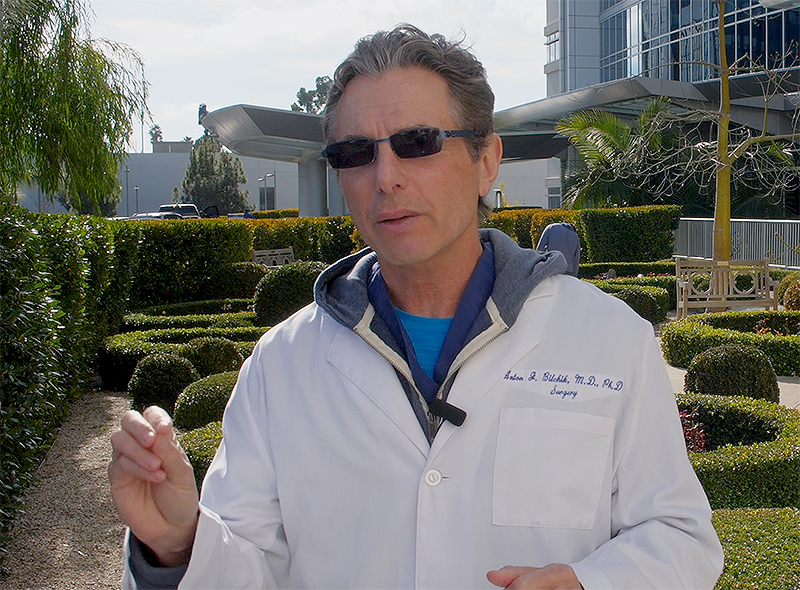
Did you Google this blog because it talks about Pancreatic Cancer?
“I cannot state it enough on how important it is to let your doctor walk you through it rather than Google pancreatic cancer and try to come up with what you think you have and how you think it should be treated,” according to Dr. Anton Bilchik, Chief of Surgery at Providence Saint John’s Health Center in Santa Monica, California. Pancreatic cancer can be overwhelming and anxiety-induced for several reasons: high mortality rate, non-specific symptoms, complex information, lack of personalized context, and, our favorite, misinformation.
In 2024, it’s estimated that 66,440 people in the United States will be diagnosed with pancreatic cancer, and approximately 51,750 will die from the disease.2 According to Dr. Bilchik, it’s the 4th leading cause of cancer-related deaths in the US.
“We now think of pancreatic cancer in a completely new way.”
– Anton Bilchik, MD
Listen to expert surgeon, Dr. Anton Bilchik, account of Pancreatic Cancer
Dr. Anton Bilchik, Chief of Surgery at Providence, Saint John’s Health Center
What are Treatment Sequencing Strategies?
- Neoadjuvant therapy: treatment given before surgery, such as chemotherapy or immunotherapy, to shrink the tumor.
- Adjuvant therapy: treatment given after the primary treatment to eliminate any remaining cancer cells, such as radiation therapy.
- Concurrent therapy: Combing therapies at the same time, such as radiation and chemotherapy.
By optimizing the order of treatments, the survival rate and overall quality of life has shown to improve outcomes through reducing adverse side effects and tailoring the treatment to an individual’s needs.
“What age do you start paying attention to what you put in your body?”
– Anton Bilchik, MD
What Causes Pancreatic Cancer?
Obesity, diabetes, smoking, chronic pancreatitis, family history, and what we eat (high intakes of sugar and processed food).1
The body will shut down at a certain point because of the length of time someone has neglected themselves. Our bodies may show no signs or symptoms that something is off until it’s too late because of its state. The earlier we take an interest in a healthy lifestyle, the more likely our bodies will show symptoms or signs that may alert us to see a doctor.
However, age and environment are still the number one reason for cancer-related diagnosis.
Treatment of Pancreatic Cancer?
The Whipple procedure is a surgical treatment for pancreatic cancer also known as a pancreaticoduodenectomy, and is a highly complex operation that a specialist performs.
The Whipple procedure involves removing the head of the pancreas and, depending on the size of the tumor, the first part of the small intestine, the gallbladder, and the bile duct. After removal, the remaining parts of the pancreas, stomach, and intines are reconnected to allow normal digestion.
Surgery is still the mainstay treatment for curing pancreatic cancers.
“If you have cancer and it’s at the head of the pancreas, the operation that is typically performed it called a Whipple procedure… it’s a complex operation and safe.”
– Anton Bilchik, MD
What are Enhanced Recovery Pathways (ERPs)?
At Saint John’s Health Center, we utilize a multi-disciplinary approach to cancer care, centering patient treatment among several contributing experts. In addition, we also enlist enhanced recovery pathways. ERPs are evidence-based protocols designed to improve patient outcomes and speed up recovery after surgery. These include preoperative care, intraoperative care, and postoperative care. The benefits are aimed at reducing hospital stays, ensuring fewer complications, and restoring quality of life sooner.
“The field of pancreatic cancer, the biology, there is some sense of optimism…we’re going to make some breakthroughs in about a few years.”
– Anton Bilchik, MD
What is the KRAS Vaccine?
The KRAS vaccine is designed to target cancers with specific KRAS mutations, such as pancreatic and colorectal cancers. Ninety percent of pancreatic cancers have a KRAS mutation, making pancreatic cancer easier to detect than ever before. The vaccine represents a significant step forward in cancer treatments, offering hope for patients with difficult-to-treat cancers.4
New Screening Method For Pancreatic Cancers
Whether you have a risk factor or any signs or symptoms of pancreatic cancer, the Galleri test or MCED (Multi-Cancer Early Detection) can detect up to 50 cancers from a single blood draw. This year, the Galleri test found stage 2 pancreatic cancer in a patient with no symptoms who took the test on a whim after a friend encouraged him. Learn about Harris Bass story here.
The Galleri Test is the only screening method we have to diagnose pancreatic cancer early. Please call our regional genetics scheduling line at 818-748-4748. Or visit, Providence.org/Locations/SoCal/Genetics-and-Genomics
SIDENOTE: Pancreatic cancers can go from stage 1 to stage 4 in under a year because of how aggressive they are.
Will I know I have Pancreatic Cancer?
Elsa Gonzalez who was diagnosed with stage 1 pancreatic cancer, explains her symptoms and depth of care provided by Dr. Anton Bilchik and Dr. Sean Ficher at Providence, Saint John’s Health Center!
Please talk to your healthcare professional if are experiencing any of these symptoms, have questions, or would like to know more about the MCED, Multi-cancer Detection Test.
Who is Dr. Anton Bilchik?
Dr. Anton Bilchik is the Chief of General Surgery, Director of the Gastrointestinal and Hepatobiliary Program at Saint John’s Health Center and the Director of the Gastrointestinal Research Program and Professor of Surgical Oncology at Saint John’sm Cancer Institute. Other specialists consistently refer to Dr. Bilchik for complex GI cases in the Los Angeles Metropolitan area.
This video was captured in February of 2024 by the Saint John’s Cancer Institute Media and Marketing team.
Sources:
- Signs and Symptoms of Pancreatic Cancer | American Cancer Society
- Pancreatic Cancer — Cancer Stat Facts
- AANA | Enhanced Recovery After Surgery
- Lymph-node-targeted, mKRAS-specific amphiphile vaccine in pancreatic and colorectal cancer: the phase 1 AMPLIFY-201 trial – PubMed


